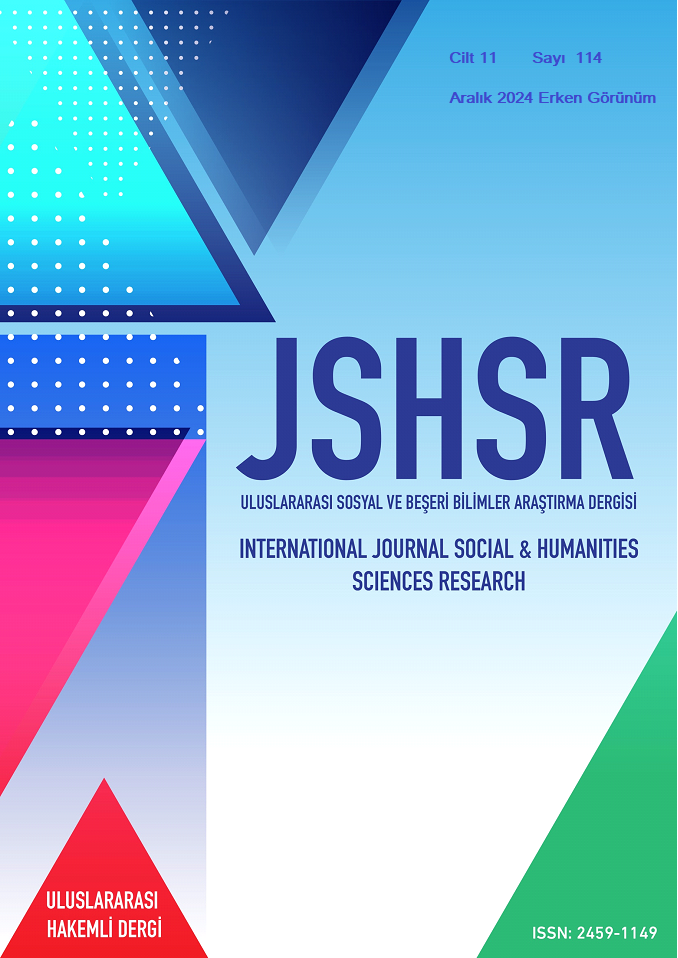First Make Yourself Happy, Then Others: The Theme of Happiness in The Works of Doğan Cüceloğlu
DOI:
https://doi.org/10.5281/zenodo.14579708Keywords:
Doğan Cüceloğlu, happiness, well-being, lifeAbstract
Since the beginning of human existence, people have sought to understand, define, and achieve happiness. Happiness is the fundamental goal of human life, and every individual is in pursuit of it. This concept has been thoroughly explored in philosophy, psychology, and social sciences. Many thinkers have presented various perspectives on what constitutes a happy life. One such thinker is Doğan Cüceloğlu, whom we recently lost.
The aim of this study is to examine the prominent themes related to "well-being" and "happiness" in Doğan Cüceloğlu’s writings, books, speeches, and publications. The research is designed within the framework of a qualitative case study approach. Data for this study was gathered from Cüceloğlu’s books, writings, publications, and speeches, with 173 quotes from his work serving as the primary data source. The findings of the study reveal that Cüceloğlu's views on happiness and well-being can be categorized into two main themes: "internal" and "external." The "internal" themes include self-awareness, proper education and guidance, realism, self-confidence, self-respect, personal integrity, pursuing one's dreams, living freely, experiencing childhood, patience, and fear. On the other hand, the "external" themes encompass cooperation, togetherness, the sense of "we," effective communication, love, respect, trust, democratic environments, acceptance of others as they are, and respect for values. The study indicates that "internal" themes are more prominent. According to Cüceloğlu, self-awareness and understanding are essential components of happiness and well-being. An individual who knows themselves and is at peace with themselves is capable of bringing happiness to those around them.
References
Bilir Ataseven, F. (2013). İthal/çeviri yoluyla pekiştirilen “korku ‘mış gibi’ kültürü” Türkiye'den örnekler. Turkish Studies - International Periodical For The Languages, Literature and History of Turkish or Turkic, 8(10), 61-66.
Bozkurt, N. (2003). Kaliteli yaşamın felsefesi. İstanbul Ticaret Üniversitesi Fen Bilimleri Dergisi, 2 (3), 15-24.
Bülbül, S. ve Giray, S. (2011). Sosyodemografik özellikler ile mutluluk algısı arasındaki ilişki yapısının analizi. Ege Akademik Bakış, Özel sayı, 113-123.
Büyükdüvenci, S. (1993). Aristoteles'te mutluluk kavramı. Felsefe Dünyası, 9, 41–45.
Cenkseven, F. ve Akbaş, T. (2007). Üniversite öğrencilerinin öznel ve psikolojik iyi olmalarını yordayan değişkenlerin incelenmesi. Türk Psikolojik Danışma ve Rehberlik Dergisi, 27, 43-65.
Creswell, J. W. (2018). Nitel araştırma yöntemleri. (3.baskıdan Çev. Ed. Bütün, M. ve Demir, S. B.). Ankara: Siyasal Kitabevi.
Cüceloğlu, D. (2020). Covid-19 geleceği nasıl etkileyecek? Çocuk ve Medeniyet, 5 (9), 181-182.
Diener, E., Oishi, S. ve Lucas, E. R. (2003). Personality, culture, and subjective well being emotional and cognitive evaluations of life. Annual Review of Psychology, 54, 403–425.
Diener, E., Kesebir, P. ve Lucas, R. (2008). Benefits of accounts of well-being-for societies and for psychological science. Applied Psychology, 57 (1), 37-53.
Dila, C. (2005). İnsanı ararken (Doğan Cüceloğlu). Türkiye İş Bankası Kültür Yayınları.
Dost, M. T. (2010). An examination of subjective well-being and life satisfaction of students attending to universities in South Africa and Turkey. Eğitim ve Bilim- Education and Science, 35 (158), 75-89.
Durak, M., Senol-Durak, E. ve Gençöz, T. (2010). Psychometric properties of the satisfaction with life scale among Turkish university students, correctional officers, and elderly adults. Social Indicators Research, 99(3), 413-429. https://doi.org/10.1007/s11205-010-9589-4.
Eryılmaz A. ve Atak, H. (2011). Ergen öznel iyi olusunun özsaygı ve iyimserlik eğilimi ile ilişkisinin incelenmesi. Elektronik Sosyal Bilimler Dergisi 10(37),170-181.
Gitmez, S. A. ve Morçöl, G. (1994). Socio-economic status and life satisfaction in Turkey. Social Indicators Research, 31 (1), 77-98.
Gülcan, A. ve Nedim Bal, P. (2014). Genç yetişkinlerde iyimserliğin mutluluk ve yaşam doyumu üzerindeki etkisinin incelenmesi. Asya Öğretim Dergisi, 2 (1), 41-52.
Kangal, A. (2013). Mutluluk üzerine kavramsal bir değerlendirme ve Türk hane halkı için bazı sonuçlar. Elektronik Sosyal Bilimler Dergisi, 12 (44), 214-233.
Merriam, S. B. (2013). Nitel araştırma. (Çev. Ed. Turan, S.). Nobel Yayıncılık.
Michalos, C. A. (2008). Education, happiness and well-being. Social Indicators Research, 87 (3), 347-366.
Özdemir, Y. ve Koruklu, N. (2011). Üniversite öğrencilerinde değerler ve mutluluk arasındaki ilişkinin incelenmesi. YYÜ Eğitim Fakültesi Dergisi, VIII (I), 190-210.
Sapmaz, F. ve Doğan, T. (2012). Mutluluk ve yaşam doyumunun yordayıcısı olarak iyimserlik. Mersin Üniversitesi Eğitim Fakültesi Dergisi, 8 (3), 63-69.
Selim, S. (2008). Life satisfaction and happiness in Turkey. Social Indicators Research, 88 (3), 531–562.
Yin, R.K. (2009). Case study methods: design and methods (4. Baskı). Thousand Oaks: Sage Pbc.
Dogancüceloglu, (t.y.). Eserleri. http://www.dogancuceloglu.net/yasam-yolculugu/.
TUİK, (2021). Yaşam Memnuniyeti Araştırması. https://data.tuik.gov.tr/Bulten/Index?p=Yasam-Memnuniyeti-Arastirmasi-2021-45832.
Downloads
Published
How to Cite
Issue
Section
License
Copyright (c) 2024 INTERNATIONAL JOURNAL OF SOCIAL HUMANITIES SCIENCES RESEARCH

This work is licensed under a Creative Commons Attribution 4.0 International License.


